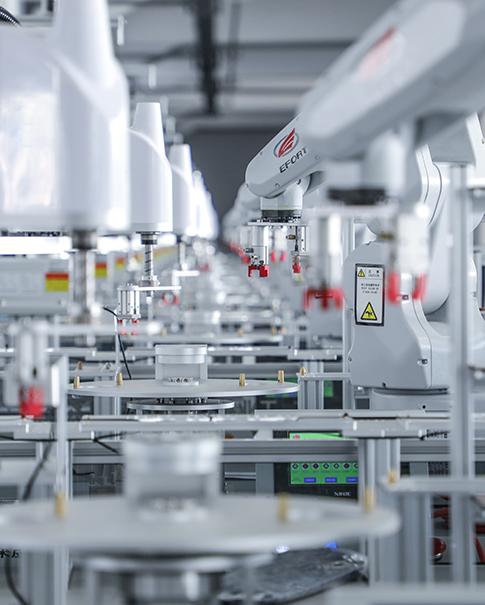Artificial Intelligence (AI) is reshaping industries across the globe, and its impact on manufacturing is nothing short of transformative. From improving operational efficiency to revolutionizing production lines, AI technologies are driving significant advancements in the manufacturing sector. In this post, we'll explore the key benefits and practical applications of AI in manufacturing, showcasing how this technology is enhancing productivity, quality, and sustainability.
AI is not just a buzzword—it's a game-changer for manufacturers looking to improve their processes. The benefits of AI are clear, including:
Enhanced Efficiency: AI-driven automation enables machines to perform tasks faster and more accurately than human workers, reducing downtime and improving throughput.
Cost Savings: By optimizing processes and minimizing waste, AI helps manufacturers reduce operational costs and enhance overall profitability.
Predictive Maintenance: AI systems can predict when equipment is likely to fail, allowing manufacturers to schedule maintenance proactively, avoiding costly breakdowns and unplanned downtime.
Improved Quality Control: With AI, manufacturers can detect errors early in the production process, ensuring that only the highest-quality products reach customers.
These advantages make AI an indispensable tool in the modern manufacturing environment.
AI is being implemented across various stages of the manufacturing lifecycle, with some groundbreaking use cases already making waves. Here are just a few examples:
Collaborative Robots (Cobots): Cobots work alongside human operators to enhance production without compromising safety. These robots are trained to learn from humans, improving both speed and precision.
Smart Supply Chains: AI helps optimize inventory management and logistics, ensuring that materials are always available when needed while minimizing waste.
Lights-Out Factories: These factories operate with minimal human intervention, relying entirely on AI and robotics to manage production processes efficiently.
These applications are just the beginning, and as AI continues to evolve, we can expect even more innovative uses to emerge.
AI isn't just a concept—it's actively transforming manufacturing today. Several industry leaders are already harnessing the power of AI for practical, real-world solutions:
AI in the Food and Beverage Industry: Accurate Gripping with Soft Robotics
In the food and drink sector, Soft Robotics’ mGripAI system is using AI to improve robotic gripping. This technology, integrated with 3D vision and AI, allows robots to delicately pick items such as fruit, meat, and bakery goods without causing damage. Using NVIDIA’s technology for real-time inference, it’s enhancing safety, productivity, and quality control in food processing environments.
AI in Quality Control: Audi's Advanced Inspection System
Audi has implemented an AI system at its Neckarsulm plant to inspect 1.5 million spot welds across 300 vehicles each shift. Previously a manual process, this AI technology improves inspection speed and accuracy, allowing staff to focus on identifying anomalies. This innovation is setting the stage for similar applications across other Volkswagen Group plants, contributing to the company’s digital transformation efforts.
AI in CNC Programming: Autodesk's CAM Assist
Autodesk’s CAM Assist, powered by AI, is transforming CNC programming by automating the creation of three-axis machining techniques. This AI-driven solution speeds up the programming process, reduces human error, and allows manufacturers to streamline production, especially in precision industries like aerospace and automotive.
AI for Clean Energy: Siemens’ AI-Powered Virtual Twins
Siemens Gamesa is leveraging AI to optimize wind farm layouts with AI-powered virtual twins. This technology allows for precise turbine placement and control, maximizing energy output while lowering operational costs. As demand for wind energy grows globally, AI plays a crucial role in ensuring that turbines perform at their best in ever-changing environmental conditions.
As AI continues to evolve, its role in manufacturing will only become more critical. The technology is continuously improving, enabling manufacturers to achieve new levels of automation, precision, and sustainability. Key trends to watch include:
AI-Driven Innovation: Expect even more breakthroughs in AI technologies that will further reduce human intervention and increase operational efficiency.
Integration with IoT: The combination of AI and the Internet of Things (IoT) will allow for smarter factories where machines communicate in real time to optimize performance and reduce energy consumption.
Sustainability: AI will play a crucial role in reducing manufacturing’s environmental footprint, from minimizing waste to optimizing resource usage.
The possibilities are endless, and AI is paving the way for the next generation of manufacturing.
In conclusion, the practical applications of AI in manufacturing are already proving to be a game changer. From predictive maintenance and quality control to AI-driven robotics and sustainable energy practices, AI is helping manufacturers boost productivity, reduce costs, and enhance their competitive edge. As technology advances, the potential for AI to revolutionize manufacturing will only grow. By embracing these innovations today, manufacturers can position themselves for success in an increasingly digital and automated future.
 Network Supported
Network Supported